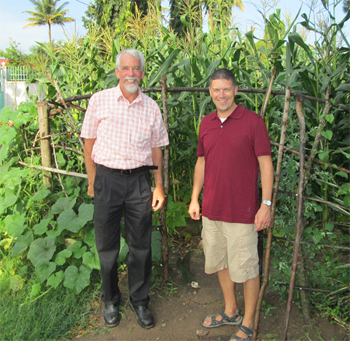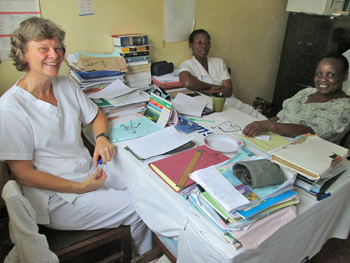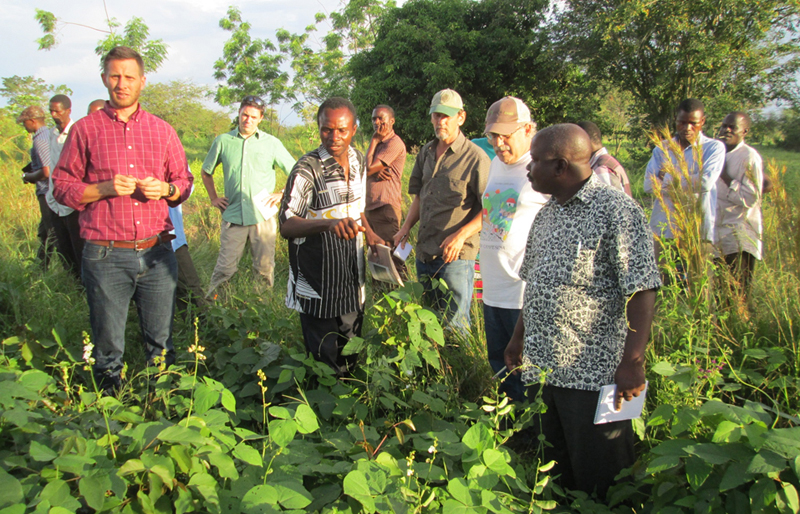Phil and Jannetta Vandenberg first settled into the community of Mwanza, Tanzania in September of 2013 as volunteers with World Renew’s Global Volunteer Program (GVP). Two years later, they are still learning and growing as they work together to serve God and those in need.
Phil and Jannetta Vandenberg first settled into the community of Mwanza,
Tanzania in September of 2013 as volunteers with World Renew’s Global Volunteer Program (GVP). Two years later, they are still learning and growing as they work together to serve God and those in need.
When they first arrived in Tanzania, the couple’s senses were challenged with many sights, sounds, and scents as they adjusted to their new surroundings; mornings were just one reminder of how different Mwanza was from their hometown of Richmond Hill, Ontario.
Jannetta described their Tanzanian mornings in this way: “While it is still dark, we wake up to the sound of the local Islamic mosque’s call to prayer. As the sun rises, we hear the songs of many types of birds in the trees around our home. Our neighbour’s six cows, his goats, the ground keeper’s chickens all call out while the dogs in the area add to the noise with their barking. We pull back the mandatory mosquito net from our bed and get up to start our day.”
For Jannetta, whose background is in nursing, a typical day in Tanzania involves serving as a Medical Assistant at the Health Centre of World Renew’s local partner, African Inland Church of Tanzania (AICT). World Renew currently partners with two dioceses of AICT, one which is a three hour drive from Mwanza. These dioceses have small mission hospitals with very limited medical resources. The majority of the communities they serve are agriculture-based.
“The AICT Health Centre is located at a busy intersection. The smell of the market, the smell of a small dump nearby and the smells of morning cooking fires also fill the air,” said Jannetta. “It has been my privilege to volunteer my time, knowledge, and assistance here with a dedicated group of Christian Tanzanian health care workers, all of whom live out the AICT vision and mission to reach out to all people in the community.”
Approximately 40-50 patients visit the AICT centre’s outpatient clinic per day. There is also a 30 bed hospital. In the hospital there is no such thing as an isolation room—instead, patients’ beds are fitted with mosquito nets as the only screen between them and others. The most common reasons for admission to this hospital include malaria, pneumonia and diarrhea. It is also common for young children to come in with severe burns they incurred by tipping over a pot of boiling water on an open fire that many families use to cook their food. While these different causes bring people to the clinic, nearly all of the patients also suffer from malnourishment and anemia.
“When we’re available for God to work through us we can do amazing things…” ~Jannetta Vandenberg
“My role involves a lot of paperwork, which is all in English, and records are kept in hard copy, as computers are not used very often,” Jannetta said. “I am more used to this environment than some might be, though, since I graduated from my nursing program in 1979!”
Over the past year, Jannetta has really enjoyed the opportunity to also take part in teaching and training sessions in maternal and reproductive health and nutrition. These sessions are a powerful way to equip more community members—both men and women—with health knowledge they can use to improve the way they care for themselves and also pass along what they have learned to others. Since women and young children are often the least likely to receive adequate health care in many poor communities, improving health for mothers and children is a critical part of this work.

“When we first came to Tanzania and traveled around with field staff, we saw so much in the rural villages that had to do with the challenges of growing crops a lack of reliable access to affordable, nutritious food,” said Phil. “And I became convinced that the best role for me would be to support agricultural trainings in our community development program with local partners.”
The farming equipment typically used in rural Tanzania is quite different from equipment Phil worked with during his long career in engineering. Instead of tractors and combines, for example, farmers till their land by hand with simple hoes and all the planting and harvesting is done by hand. Nevertheless, Phil quickly saw opportunities to put his expertise to use while learning from and working alongside farmers in Tanzania. He realized that the thousands of farmers that World Renew partners work with could benefit from trainings in how to build up healthy soils through the teachings of conservation agriculture principles.
“These farmers have been growing crops using the same traditional farming methods for generations, which has mined the soil of its nutrients,” he explained. “All of the good value that was in the soil 20-30 years ago has been used up by continuous planting of corn and by not using manure or fertilizers to replenish these nutrients. And now the soils are being eroded and washed away by heavy rains or blown away by winds. We want to help the farmers to learn how to build healthy soils. Healthy soils will grow healthy crops.”
In order to show the positive impact of the principles of conservation agriculture, Phil planted a small demonstration garden at the AICT Mwanza church headquarters where he could put various agricultural principles into practice. Three techniques that have proven to help build healthy soils are crop rotations using legumous crops, using mulch to add organic matter to the soil as an alternative to burning off the crop residue, and teaching the concept of reduced tillage which helps to conserve soil moisture.
Once a week Phil meets with the AICT leadership team, bases his devotions on stewardship and the responsibility for caring for creation, and then invites the class to come to the demonstration garden to see these practices in action and learn from what they see. There are many questions and change will come slowly. However, it is clear that the new teachings have resulted in healthier crops, increased yields, and improved weed control.
“The pastors, farmers, and other community leaders that come through see firsthand what it really looks like to apply the farming principles they were learning about in class,” said Phil. “And they can then take these practices into the villages to teach others.”
The Sukuma are the largest tribal group in Tanzania and many Sukuma people live in the area where Phil and Jannetta work. Although Phil and Jannetta do not speak Sukuma, they found out recently that in the language of this tribal group they do not have a future tense or a word for ‘development.’
“I think a light went on in our heads when we learned these two things about their language,” said Jannetta. “We realized that is part of the challenge in the work that World Renew does here. Because if there’s no word for development, then you’re not thinking about the future, you’re only thinking about today and the past. And it poses a challenge as to what you can do to help people see that in the future life can be better. So that was a real insight for us, it helps us understand the situations that we have to work with as well.”
This past June, Phil and Jannetta returned to Canadian soil and are spending the summer sharing about their work in Tanzania and visiting with friends and family. They will then travel back to Mwanza at the end of August to serve a third term as volunteers.
“We are excited and really thrilled that at this stage in our life we’re able to give back and share our time and our knowledge as volunteers with World Renew,” said Phil.
Both Phil and Jannetta have appreciated the chance to lead and participate in devotions as they work alongside the faithful and skilled men and women in Tanzania, since praying and reflecting on scripture together is an essential part of remembering the biblical basis of the work.
As Jannetta reflected on their volunteer journey so far, one verse that she highlighted was 1 Corinthians 3: 7-9: “So neither he who plants nor he who waters is anything, but only God, who makes things grow. The man who plants and the man who waters have one purpose, and each will be rewarded according to his own labor. For we are God's fellow workers; you are God's field, God's building.” (NIV)
“When we’re available for God to work through us we can do amazing things,” she said. “So we need to go out and do what he asks us to do. That is what we continue to do—and it has been an amazing journey for us.”


